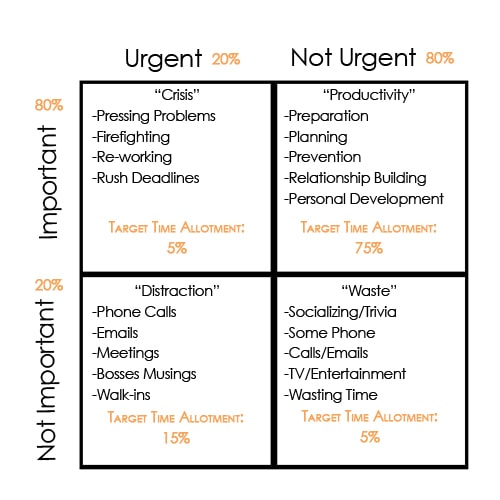Do you produce amazing results?
We all have the same number of minutes in the day as the Pope, Bill Gates, and Elon Musk. Are you using those minutes to create amazing results personally and professionally? Focusing can create incredible results. Not focusing - procrastinating, reacting, distractions - results in very little getting accomplished. In fact one study found that the average knowledge worker spends 1.7 hours per day doing nothing productive at all. If you can follow these guidelines from Mark Sanborn, you'll be astounded by the results you are able to produce:1. Focus on the Right Things
What are the right things? Sanborn suggests that there are between 6 and 8 things that we do that give the biggest return on the investment of our time and expertise (our Most Profitable and Valuable activities). Focus on those to produce amazing results.

- Take time to identify and list them. Keep the list updated.
- Spend 60-80% of every day doing them. We don't completely control our time, but we should make every effort to limit time spent dealing with distractions to 20-40%
2. Deal with Distractions

What keeps us from being focused? Distractions are deadly. Distractions happen to the average knowledge worker every 11 minutes. Research shows that it takes 20 minutes to refocus on the task on hand following a distraction - therefore - if we don't prevent ourselves from getting distracted we're in danger of not accomplishing anything meaningful at all.
3. Quit Multitasking

It's now commonly accepted (following extensive research) that the ability to multitask successfully is probably a myth. Singular focus is critical for getting amazing results.
- Give up on multitasking. Research shows it's almost impossible to do effectively. Train yourself not to get distracted by emails, texting, or apps and focus on the task at hand.
- Tackle your hardest task first thing in the morning. Focus and concentration first thing can make this your most productive time of day.
- Establish a "no laptops, no phones" rule for your team meetings.
- Allow yourself to think and be alone. Your best ideas and deepest insights will come when you're not involved in everyday activities.
4. Don't be Ruled by your In-Box

Emails are usually the greatest single cause of loss of focus. We hear the chime or see the desktop alert as a new email arrives and all too often we stop what we're doing to read and respond. Even clicking through the alert to read the email breaks our focus on what we're working on.
It's more efficient to deal with 50 emails in one go, with focused attention, than it is to handle them piecemeal.
- Email alerts are optional. Turn them off and make time to focus on reading and responding to emails periodically, rather than as they arrive.
5. Triage Distractions
Mark Sanborn observes that we confuse what's important and relevant with what's interesting and enjoyable. Often times we allow ourselves to be distracted by an email alert or a colleague stopping by because the interruption might turn out to be more interesting.
 Source: Pushing the Envelope
Source: Pushing the Envelope
- If the distraction is important and actionable now, deal with it as quickly as possible and refocus on what you were doing before it happened.
- If it's actionable but not important now, avoid the temptation of dealing with it now. Address at an appropriate time.
- If it's important but not actionable now, the same applies.
- If it's neither important nor actionable... Ignore it!
6. Schedule Time for Important Tasks
When working on an important task, avoid all distractions you can.

-
- Block time in your calendar, schedule it. Make sure all know that you won't be available.
- Work behind closed doors for scheduled periods with a sign not to interrupt. Providing you do this with discretion your self-cloistering should be acceptable in most workplace cultures.
- When distractions occur - phone calls, people stopping by - use the phrase "I'll get back to you" where possible. Then get back in a timely manner as soon as you have completed what you needed to complete.
Remember... You're judged by what you accomplish, not how busy you are
Activity is the anesthesia of ineffective leadership. We can do much each day and leave having accomplished very little. By being focused we can do less and accomplish more. Execution and output, not activity, is key.
Does your team produce amazing results?
Every manager has three resources: their time, their expertise, and the time and expertise of people on their team. Yet not every manager takes the time to ensure people on their team are focused, to set up the team for amazing results.
7. Create Shared Focus

- Everyone is focused on something - but is it what they need to be doing? With the exception, perhaps, of a Buddhist zen master, our brains are always focused on something every moment of the day. This truism applies to your team as well. As a leader, it’s important to understand what they’re working on. To stay in the loop, ask each team member to send you a weekly list of what they plan to accomplish during for the week.
- What you allow, you condone. People assume consent by silence. As a leader, it is important to be clear about what is allowed and what is not. If you allow it you condone it and if you condone it they'll keep doing it.
- What you celebrate, you encourage. Celebration focuses attention and what gets attention gets done. Be specific and deliberate about what constitutes a “win”. Employees are encouraged when they see their actions celebrated, and naturally, they will want to continue their winning streak. This helps your team not only better prioritize their time, but want to better prioritize their time.
- Don't ever expect what you don't inspect. Asking an employee to do something does not, by default, ensure it gets done. As a leader, it is your responsibility to set up an audit system to ensure things don’t fall through the cracks.
- Behavior is always believed over words. People listen to our words and watch our behavior. Therefore, ensure that you adhere to the very time management principles you pass along to your team.
8. Focus your Team on the Right Things

- Ask each team member to list their top ten things they are paid to do, in order of importance.
- Create your own list, one for each person.
- Meet with each team member and compare lists. The outcome of meeting is a shared list.
9. Take Time to Develop your Team

- Take time to mentor, coach, and counsel.
